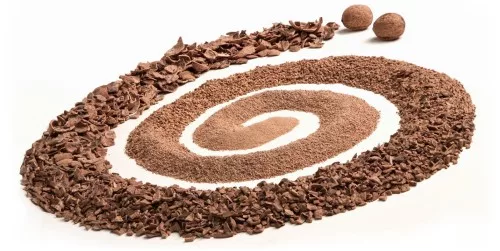Choosing Sustainable Raw Materials for a Greener Future

In today’s world, it’s no longer enough to just manufacture a product. Consumers are increasingly demanding their products be produced using sustainable processes and materials with minimal environmental impact. At Reade, we believe sustainably sourcing raw materials plays a key part in ensuring a greener future.
Manufacturing products according to green chemistry principles involves processing raw materials in ways that are safer and more environmentally friendly, such as by replacing toxic solvents with water or less-toxic organic solvents. It can also involve replacing traditional raw materials with renewable feedstocks. When made using the optimal renewable feedstock, products can retain their existing attributes and performance, but in a more environmentally friendly and often more cost-effective way.
“As part of our commitment to sustainability, we are expanding our network of suppliers who offer sustainable and bio-based products.” – Amanda Reade Sturgeon
As part of our efforts to promote a circular economy and bioeconomy, Reade is currently focused on expanding our database of suppliers offering sustainable products. This includes a wide selection of quality, sustainable raw materials from reliable suppliers, with a track record of environmentally-friendly practices.
Sustainable Raw Materials
Sustainable raw materials include all-natural, bio-based products that are biodegradable, as well as recyclable feedstocks—all of which help reduce post-consumer waste. Many of these materials are renewable and can be replenished naturally over time and are produced using green chemistry principles. Below are some of Reade’s most popular sustainable raw materials.
BIO-BASED RAW MATERIALS
Hemp fiber is grown without using pesticides and can be cultivated using minimal water. It comes in a variety of qualities that are suitable for different applications and can replace several less-sustainable materials including:
- Wood in the building and construction industries, and engineered wood products
- Wood shavings and paper animal bedding
- Fillers used in fiberglass composites
Walnut shell is a versatile, non-toxic, and cost-effective material for a wide array of industrial uses. Walnut shell is all-natural, non-GMO, made from a food byproduct, and produced in solar-run facilities. Walnut shells are pesticide-free and sustainably grown, with no chemical processing, meaning they are heavy metal and asbestos-free. As a reclaimable and biodegradable material, it provides a sustainable alternative to:
- Plastic microbeads as an exfoliant in the cosmetics industry
- Sand used in blasting and polishing
- Clay or silica used in kitty litter
- Polymeric fillers and extenders
- Synthetic fillers used in molded plastics
- Sand proppants used for oil drilling
- Diatomaceous earth used for water filtration
Pecan shell does not require the use of additives or processes to alter its physical state. As such, it produces no residues and is biodegradable. Similar to walnut shell, it is used in a variety of applications, including resins/epoxies, landscaping, and cosmetics. Some examples of materials it can replace include:
- Sand proppants used in the oil industry
- Sand abrasives
- Diatomaceous earth in filter media
Corn cob is derived from the woody portion of corn and is an all-natural biomass resource. When used in blasting media, it is reusable and has also been used as a chemical waste adsorbent and in sweeping compounds. Corn cob is a sustainable alternative to several materials including:
- Perlite when used as a soil conditioner
- Microplastic exfoliants in cosmetic soaps
- Polystyrene foam and plastic bubble wrap packing materials
RECYCLABLE RAW MATERIALS
Not all sustainable products are biodegradable, but that doesn’t mean they don’t have environmental benefits of their own. The use of any recycled material can help reduce the need for virgin materials, eliminating the need to extract raw materials from the earth and helping create a more circular economy.
Recycled glass can be used to replace:
- Slags used in blast abrasives
- Virgin glass used in highway bead and fiberglass
Aluminum is infinitely recyclable. It is incredibly lightweight (up to 65% lighter than steel), therefore reducing the carbon footprint of the materials it is used in.
- High strength-to-weight ratio
- Recycled aluminum takes only about 5% of the energy of virgin aluminum production
Magnesium is the lightest structural metal which helps reduce the carbon footprint of materials it’s used in, especially when replacing heavier elements.
- 75% lighter than steel, 50% lighter than titanium, and 33% lighter than aluminum
- Consumes less energy throughout its production process than heavier metals
- Can be 100% recycled and dissolves naturally, leaving no trace
Aluminum and magnesium-based alloys can replace high-density, iron-based materials, leading to weight reduction and associated improvements in energy consumption and reduced greenhouse gas emissions.
Stainless Steel is durable, and its production process does not produce toxic run-off.
Find the right sustainable feedstock for your process
At Reade, we understand how overwhelming it can be to determine which sustainable raw material is optimal for your specific application. That’s why our team is always available to guide you through this process and help you find the ideal sustainable feedstock.
Join us in our commitment to a greener future by choosing sustainable raw materials. Contact us to learn more about our sustainable alternatives and how we can help you make the switch to a more sustainable process.
ABOUT READE
Reade Advanced Materials is a 100 year-old plus metal powder supplier and represents over 2,000 manufacturers worldwide with a diverse inorganic product line. READE also offers toll processing and packaging services for metal powders from three facilities in The Americas. As your metal powder supplier, READE offers one of the largest portfolios of specialty chemical solids. The materials are available in an extensive range of forms including sheet, foil, film, lump, powder, rod, wire, and tube.
Contact
Director of Marketing
Elisabeth Law, +1-401-433-7000
Elaw@reade.com


